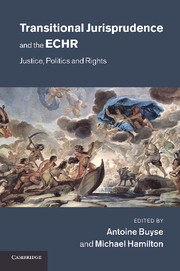Book contents
- Frontmatter
- Contents
- Foreword
- Acknowledgements
- 1 Introduction
- 2 Transitional emergency jurisprudence
- 3 Rights and victims, martyrs and memories
- 4 Confronting the consequences of authoritarianism and conflict
- 5 Freedom of religion and democratic transition
- 6 The truth, the past and the present
- 7 Transition, political loyalties and the order of the state
- 8 Transition, equality and non-discrimination
- 9 Closing the door on restitution
- 10 The Inter-American human rights system and transitional processes
- 11 The ???transitional??? jurisprudence of the African Commission on Human and Peoples??? Rights
- 12 Conclusions
- Index
- References
5 - Freedom of religion and democratic transition
Published online by Cambridge University Press: 07 September 2011
- Frontmatter
- Contents
- Foreword
- Acknowledgements
- 1 Introduction
- 2 Transitional emergency jurisprudence
- 3 Rights and victims, martyrs and memories
- 4 Confronting the consequences of authoritarianism and conflict
- 5 Freedom of religion and democratic transition
- 6 The truth, the past and the present
- 7 Transition, political loyalties and the order of the state
- 8 Transition, equality and non-discrimination
- 9 Closing the door on restitution
- 10 The Inter-American human rights system and transitional processes
- 11 The ???transitional??? jurisprudence of the African Commission on Human and Peoples??? Rights
- 12 Conclusions
- Index
- References
Summary
Introduction
Article 9 of the 1950 European Convention on Human Rights and Fundamental Freedoms (ECHR) protects the right to freedom of thought, conscience and religion. However the case law related to this right has only begun to develop quite recently, with the first judgment finding a violation of this article only delivered in 1993. Since then a rich and often controversial jurisprudence has begun to develop, including the two judgments on Turkish attempts to ban the wearing of Muslim headscarves in certain higher education establishments, the fallout from the publication of cartoons of the prophet Muhammad in Denmark in 2005, and the Grand Chamber’s reversal of the judgment backing a challenge to the display of the Christian crucifix in Italian state schools. No doubt the Swiss attempt to ban the construction of new minarets will also give rise to some thought-provoking argumentation.
- Type
- Chapter
- Information
- Transitional Jurisprudence and the ECHRJustice, Politics and Rights, pp. 103 - 130Publisher: Cambridge University PressPrint publication year: 2011
References
- 1
- Cited by



